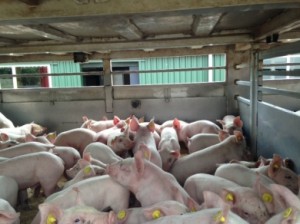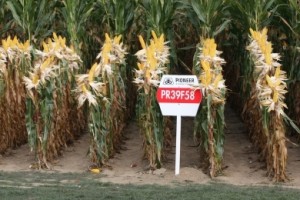Weltlog Woche 6 – 2014
Endlich kommt die Kontrolle von Tiertransporten wieder in öffentliche Hand. Schon 2011 habe ich hierzu einen Antrag gestellt der auch eine Mehrheit fand, aber wir mussten bis 2014 warten bis auch die Staatssekretärin endlich einsah, dass es nicht länger so weiter gehen kann. Staatssekretärin für Wirtschaftsfragen Dijksma liess letzte Woche wissen, dass sie das Aufsichts- und Kontrollsystem des Tiertransportsektors nicht länger anerkennt und die Verantwortung wieder in die eigene Hand nimmt.
Millionen Tiere werden jährlich über die Grenzen verfrachtet. Die Transporte gehen regelmässig mit ernstem Leiden der Tiere einher. Tiere stehen häufig acht Stunden lang in übervollen Wägen ohne Nahrung oder Wasser. Regelungen zum Schutz der Tiere werden schlecht eingehalten und es wurde in den letzten Jahren drastisch bei der Regierungsaufsicht eingespart. Selbstregulierung des Tiertransportsektors erweist sich also als nicht wirksam. Das Parlament gab deutliche Anweisungen: Die Regierung muss tun wofür sie da ist, nämlich Normen aufstellen, diese kontrollieren und handhaben. Geschwindigkeitskontrollen werden ja auch nicht den Automobilisten selbst überlassen. Wir sind froh, dass die Aufsicht wieder Verantwortung der Regierung wird und werden uns weiter dafür einsetzen, dass das hin und her kutschieren von Tieren ein Ende findet!
Meine Kollegin Esther Ouwehand hat sich letzte Woche gegen die geplante Einführung einer neuen gentechnisch manipulierten Pflanze in die EU eingesetzt. Die europäische Komission droht der Zucht der, von Pioneer entwickelten, gentechnisch manipulierten Maissorte 1507, ihre Zustimmung zu geben. Wenn das passiert werden alle europäischen Mitgliedsstaaten dazu verpflichtet, die Zucht dieser umstrittenen Pflanze auf ihren Feldern zuzulassen.
Länder, die kein Risiko mit Gentechnik eingehen wollen, wie zum Beispiel Österreich und Frankreich, befinden sich schon länger im Widerstand. Die Niederlande haben ihren Standpunkt immer noch nicht deutlich gemacht, wobei dieser entscheidend sein kann für die Zulassung der Genpflanze in die gesamte EU. Darum haben wir unsere Regierung dazu aufgefordert die Entscheidungsfreiheit der Bürger, Bauern und Mitgliedsstaaten an erste Stelle zu setzen und gegen eine Zulassung neuer gentechnisch manipulierter Pflanzen zu stimmen.
Wir lehnen gentechnische Manipulation entschieden ab und sind der Meinung, dass auf jeden Fall kein Land gezwungen werden sollte Genpflanzen auf ihren Feldern anzubauen. Der umstrittene Mais von Pioneer ist eine gentechnisch manipulierte Pflanze, die ununterbrochen einen Giftstoff freisetzt. Das von der Pflanze selbst produzierte Gift, soll den Maiszünsler ausschalten, fügt aber auch anderen Schmetterlingen und Motten Schaden zu. Ausserdem ist die Pflanze resistent gemacht gegen Pestizide die Glufosinat enthalten. Obwohl Wissenschaftler davor warnen, dass das resistent machen von Pflanzen dazu führt, dass mehr Pestizide angewendet werden, ist man in Brüssel im Begriff eine Genpflanze zuzulassen, die resistent ist gegen ein Mittel mit grossen Risiken für Säugetiere und andere Organismen. Gerade wegen den Gefahren von Glufosinat wird abgeraten dieses Pestizid überhaupt zu benutzen. Hoffentlich sieht unsere Regierung auch welche Gefahren darin liegen gentechnisch manipulierten Mais zuzulassen und verhindert die Zulassung!
Es ist depremierend zu lesen wie es Bulgarien und Rumänien geht. Lesen sie hier den Blogbericht des Economist über die Situation in diesen beiden Ländern.
Auch diese Woche wieder ein Foto von @Fascinatingpics: Freefall!
Bis nächste Woche!
Marianne
The control of animal transportation will at last go back into the hands of the government. In 2011, I already laid down a motion on this, which was then also supported by the majority, yet we had to wait until 2014 before the State Secretary finally realised that animal transportation couldn’t go on like this. State Secretary Dijksma of Economic Affairs finally informed us last week that she no longer acknowledges the supervision and control system of the animal transportation industry and that she is taking responsibility into her own hands again.
Each year, millions of animals are transported across the borders. Those transportations regularly involve animal suffering. Animals often have to stand in overcrowded lorries for more than eight hours without any food or water. Animal protection regulations are seriously violated and drastic cuts were imposed on government control over the past years. Self-regulation within the animal transportation industry is obviously not working. The Lower House was clear: The government must do what it is there to do, namely to set standards, and to control and maintain them. You would not opt for car drivers to perform their own speed checks either. We are glad that the supervision is given back to the government and we will continue to do our best to stop them mucking about with animals.
Last week, my colleague Esther Ouwehand made out a case against the introduction of a new GM crop in the EU. It is feared that the European Commission will permit the growing of the genetically modified maize line 1507 of Pioneer. If that happens, all European Member States will have to allow the growing of the controversial crop on their lands.
Countries that do not want to run risks with genetically engineered foods like Austria and France have been objecting for a long time. The Netherlands has still not made clear its position on this, while this can be the determining factor in reaching a decision on permitting this crop in the entire EU. We have therefore urged our government to put the choice of civilians, agriculturists and Member States first and foremost, and to vote against permitting such new GM crops.
We resolutely reject genetic modification and feel that no country should be forced to have GM crops grow on their lands. The controversial maize of Pioneer is a genetically modified plant, which releases a poisonous substance. The poison produced by the plant itself is intended to eliminate the corn borer, but is harmful to butterflies and moths at the same time. Additionally, the plant has been made resistant to pesticides containing gluphosinate. While scientists warn that the use of pesticides will increase when crops are made resistant, Brussels is on the verge of accepting a GM crop that is resistant against a pesticide that has great risks for mammals and other organisms. Because of the dangers of gluphosinate, it is tried to restrain the use of this pesticide. Hopefully our government will also see the dangers of allowing genetically modified maize and stop it!
It is depressing to read how Bulgaria and Romania are doing. Read here the blog in the Economist about the situation in those two countries.
And this week again a picture of @Fascinatingpics: Freefall!
Until next week!
Marianne

